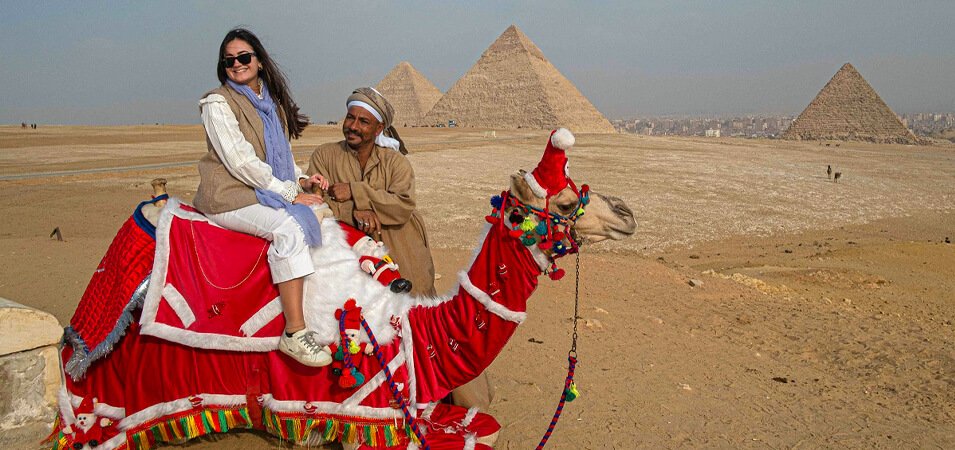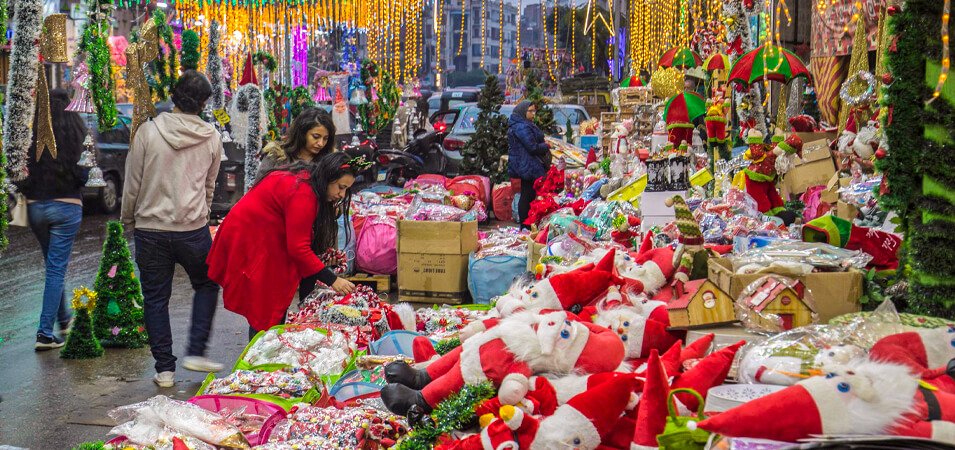Christmas in Egypt is a vibrant and deeply spiritual celebration, rooted in both religious significance and unique cultural traditions. While Christmas is celebrated across the world, Egypt’s observance stands out, particularly for its close connection to the country’s Coptic Orthodox Christian community. The holiday in Egypt is marked by distinctive customs, a blend of ancient practices, and regional flavors that make it a special occasion in the heart of the Middle East.
Religious Customs and Traditions
Coptic Christmas Celebrations
Christmas in Egypt is not only a time of joy but also a deeply spiritual occasion, shaped by centuries-old Coptic Orthodox traditions. These customs center around fasting, prayer, and church services that reflect the solemnity and significance of Christ’s birth.
Fasting Before Christmas
For Coptic Orthodox Christians, the period leading up to Christmas is marked by the Nativity Fast, which lasts 43 days. This fast, also known as Advent, is a time of spiritual reflection, prayer, and penance.
- Spiritual Importance: The fast prepares believers for the celebration of Christ’s birth, promoting self-discipline and spiritual growth.
- Food During the Fast: As part of the fast, Copts avoid meat, dairy, and eggs. Instead, they consume vegan meals such as lentils, beans, and vegetables. These meals are simple but nutritious, reinforcing the idea of humility and reflection.
Christmas Eve Services
On January 6, Coptic Christians gather for Christmas Eve services, which culminate in the midnight mass. The service is a solemn, multi-hour ritual that includes hymns, prayers, and the Divine Liturgy.
- Midnight Mass: The midnight service is the highlight of Coptic Christmas celebrations. It begins with a vigil of prayer and hymns before the liturgy, which marks the birth of Christ. The atmosphere is solemn and reverent, filled with incense and candlelight.
- Kiahk Hymns: These hymns, unique to the Coptic Church, are sung during the Advent period leading up to Christmas. The “Kiahk” hymns are particularly significant, as they express longing and anticipation for Christ’s birth, using rich theological language and ancient melodies.

Symbolism in Coptic Christmas
Coptic Christmas celebrations are rich with symbolism that reflects the deep spiritual and cultural heritage of Egypt’s Christian community. From the use of candles to icons, every element serves to remind the faithful of the significance of Christ’s Nativity.
Candles, Incense, and Icons
- Candles: Representing Christ as the Light of the World, candles are an essential part of Coptic Christmas services and decorations. They are used in the midnight mass to symbolize the coming of the Savior.
- Incense: Burning incense during services is a symbol of prayers rising to God. It’s used extensively during Christmas Eve services, adding a sensory dimension to the prayerful atmosphere.
- Icons: Coptic Orthodox Christians use religious icons (painted images of Christ, the Virgin Mary, and saints) to tell the story of the Nativity. These icons are placed prominently in homes and churches as a way to honor the sacred event.
The Nativity Story in Egyptian Art and Rituals
In Egyptian Christianity, the Nativity story is portrayed through art, rituals, and ceremonies that blend biblical narratives with local cultural traditions. In Coptic churches and homes, the story of Christ’s birth is depicted through intricate icons and mosaics, often showing the Holy Family, the Magi, and the angels.
- Coptic Art: The use of bright colors and symbolic elements like stars and halos reflects the heavenly nature of Christ’s birth. These images are often found in the churches and homes of Egyptian Christians during the Christmas season.
- Rituals: The Nativity story is also brought to life in liturgical rituals, where the clergy and congregation participate in reenactments and prayers that highlight the humility and sacredness of Christ’s birth.
Modern Christmas Celebrations Across Egypt
Christmas in Urban Areas
As globalization and urbanization have influenced Egypt, Christmas celebrations in major cities like Cairo have evolved to incorporate more modern, commercialized elements alongside traditional Coptic customs. Urban centers see a blend of both religious observances and secular festivities, reflecting Egypt’s diverse population and the influence of Western culture.
Festivities in Cairo
Cairo, as the heart of Egypt, offers a lively and diverse mix of Christmas activities. The city is transformed with holiday markets, shopping malls, and vibrant public events, especially in areas like Zamalek and Downtown Cairo.
- Christmas Markets & Shopping: Modern shopping centers and markets host special Christmas events, with decorations, gift stalls, and entertainment. Locations like City Stars Mall and Mall of Arabia feature large Christmas trees, festive lights, and special promotions.
- Expatriates & Locals: Expatriates, particularly from Western countries, celebrate with familiar customs like gift exchanges and family gatherings, while local Egyptians blend these celebrations with traditional Coptic services. Many people attend the midnight mass at famous churches like St. Mark’s Cathedral and then enjoy a meal with family.
Alexandria and Other Major Cities
In Alexandria, and other coastal cities like Port Said and Tanta, Christmas celebrations often reflect local traditions, influenced by the Mediterranean culture and proximity to Western Europe.
- Coastal Traditions: In these cities, Christmas Eve dinners are a highlight, with seafood and traditional Egyptian dishes like fatta (a rice and meat dish). Churches and community centers play a vital role in bringing the community together for midnight services, followed by festive gatherings.
- Community Focus: Churches often organize charity events, where food and gifts are distributed to those in need, emphasizing the spirit of giving and solidarity. Many people also gather at local beaches to celebrate Christmas with friends and family.
Christmas Decorations and Lights
One of the most noticeable aspects of modern Egyptian Christmas celebrations is the rise of Christmas decorations and lights, particularly in urban areas.
- Adoption of Western Decor: While these elements are not traditionally Coptic, they have been embraced by many Egyptian families, especially in urban areas. Christmas trees adorned with lights and ornaments are commonly placed in homes and public spaces.
- Shopping Malls and Hotels: High-end hotels and malls, such as The Nile Ritz-Carlton and Cairo Festival City Mall, create elaborate holiday displays, attracting both locals and tourists with their festive atmospheres.
Popular Spots for Viewing Lights and Decorations
Certain areas of Cairo and Alexandria are well-known for their Christmas decorations and light displays:
- Cairo: Mohandiseen and Zamalek are two neighborhoods where homes and businesses go all out with lights, especially in high-end districts. The streets are often lined with twinkling lights, creating a festive atmosphere.
- Alexandria: The Corniche and other central areas in Alexandria are also decorated with lights, offering picturesque views by the sea. Local churches in Alexandria also host special Christmas light displays to welcome both locals and visitors.
Egyptian Christmas Cuisine
Traditional Foods for the Season
Food plays a central role in Egyptian Christmas celebrations, particularly when it comes to post-fasting feasts that follow the 43-day Nativity Fast. These meals are not just about nourishment, but about gathering with family and sharing in the joy of the holiday.
Post-Fasting Feasts: The end of the Nativity Fast is marked by elaborate feasts, where families come together to celebrate with a variety of special dishes. These meals symbolize abundance after a period of fasting and are shared among family and community members.
Special Dishes:
- Fattah: A traditional Egyptian dish made with rice, bread, garlic, and vinegar, usually served with lamb or beef, symbolizing the richness of the holiday meal.
- Roasted Meats: Lamb, beef, or chicken are often roasted and served as the centerpiece of the Christmas feast.
Sweets and Desserts
Egyptian Christmas desserts are an integral part of the holiday season, offering sweet treats to complete the festive meal. These desserts often have symbolic meanings tied to the holiday’s themes of abundance and joy.
- Kahk: These cookies, filled with dates or walnuts, are a traditional Christmas treat, often dusted with powdered sugar. They are usually baked in advance and shared with neighbors and friends as a sign of goodwill.
- Other Pastries: In addition to kahk, baklava, basbousa (semolina cake), and qatayef (sweet dumplings filled with nuts or cream) are also popular during the holiday season.

Travel Tips for Experiencing Christmas in Egypt
Christmas in Egypt offers a unique blend of religious traditions, cultural experiences, and historic sites. Whether you’re drawn to Cairo’s ancient churches or the beauty of the Nile, Egypt has much to offer for holiday travelers.
Cairo’s Historic Churches
Cairo, the heart of Egypt’s Christian community, is home to several iconic churches that are must-visit destinations during Christmas. These landmarks are not only significant for religious history but also offer insight into Egypt’s rich Coptic Christian heritage.
- The Hanging Church (Saint Sergius and Bacchus): Located in Coptic Cairo, this ancient church is a key site for Christmas celebrations. Its stunning architecture and historical significance make it a must-see.
- St. Mark’s Cathedral: As the largest Coptic church in Egypt and the headquarters of the Coptic Orthodox Church, St. Mark’s is the center of Christmas Eve services. The church hosts a beautiful midnight mass that attracts thousands of Copts from across the country.
Luxor and Aswan
For those looking to combine Christmas with a unique travel experience, a Nile River cruise from Luxor to Aswan offers a spectacular way to celebrate the season. These cities, known for their ancient monuments and serene landscapes, offer a tranquil holiday experience.
- Nile Cruise Experience: A Christmas cruise on the Nile River offers a relaxing atmosphere with plenty of time to enjoy festive dinners, cultural performances, and sightseeing, including visits to iconic temples like Karnak and Valley of the Kings.
- Celebrating in Luxor & Aswan: The cities’ historic churches, such as St. George’s Church in Luxor, host special Christmas Eve services and community gatherings, blending ancient Egyptian heritage with Christian traditions.
Practical Advice for Visitors
If you’re visiting Egypt during Christmas, here are some essential tips to make the most of your trip:
Timing Your Visit
Christmas in Egypt is celebrated on January 7th (Coptic Christmas), not December 25th, due to the use of the Julian calendar. This means if you’re used to Western celebrations, you’ll experience fewer public festivities on December 25th, but hotels and tourist spots will still have Christmas events. The period from December 25th to January 7th is the best time to visit for markets, events, and festive activities, especially in Cairo and Alexandria.
New Year’s Eve also sees public celebrations, fireworks, and hotel galas.
Cultural Sensitivities
- Respect Religious Practices: Egypt is predominantly Muslim, so be mindful of local customs. During Christmas, Coptic Christians fast, attend church services, and gather for family meals. Respect the solemnity of religious events, especially at churches.
- Engaging in Festivities as a Tourist: Visitors can join in the festivities by attending Christmas Eve services or enjoying the Christmas markets, where you can sample traditional foods, shop for handmade gifts, and experience Coptic carols.
Conclusion
Christmas in Egypt is a rich blend of ancient religious traditions and modern celebrations. From the Coptic Advent fast and midnight mass on January 7th, to the vibrant markets and festive decorations in cities like Cairo and Alexandria, Egypt offers a unique way to celebrate the season. The country’s historic churches, traditional cuisine, and growing holiday tourism all contribute to a distinctive Christmas experience.
If you’re planning to visit Egypt during Christmas, you’re sure to have an unforgettable experience. We’d love to hear about your own plans or experiences in celebrating Christmas in Egypt—feel free to share in the comments below!
